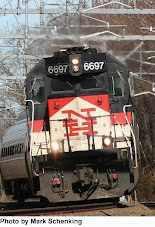UrbanCompass.net has had terrific coverage of all things Springfield. Of note to Commuter Rail advocates, however, is the discussion on the recent Globe article (see below).
http://urbancompass.net/?p=843
* and a note about the "500 million" figure, that it would "cost over $500,000 per person to add 800 new commuters to the proposed service over a 14 year period." This figure is devised by including CT's contribution (dividing ridership by the total cost of project). It is inaccurate to indicate that MA will pay this amount.
****MA will only contribute 30 million for the construction, and about 2mil for annual operating.****
And even CT's total project cost (about 270m) includes a 40% contingency built in. They have to spend more on stations and infrastructure than MA does.
CT is going ahead with the NHHS line. If, due to Massachusetts' apathy, Enfield is the end of the line, Springfield will lose.
Saturday, December 15, 2007
Friday, December 7, 2007
Suburb of NewYorSton*

How do the builders of a better Springfield get around? Do they continue to pollute the region?
Fortunately it won’t cost the Commonwealth of Massachusetts “hundreds of millions of dollars” to connect Springfield to the State of Connecticut’s a commuter rail system to alleviate the congestion along I-91, thus lessening the pollution that creates the an area with some of the worst air quality in the nation. It only would cost $30 million. Far cheaper than other rail options on the table in our Commonwealth. Perhaps the Rappaport Institute for Greater BOSTON does not include enough focus on Western concerns.
Professor Glaeser’s map of possibilities is limited. “Human capital” needs transportation too. Looking only at Springfield, and failing to connect the dots prevents him from seeing the real opportunities rail presents. If we see the connections Springfield makes to Hartford, and connect it to New Haven, we then see the rail line that connects New York to Boston. Keeping us disconnected to New York and Boston will NOT make entrepreneurs want to move here. Allowing those innovators to have a fast, reliable and easy connection to their former networks WILL make them want to move here, as the Rhode Island Economic Policy Council has found in its network studies.
Rail is one part of economic development and environmental responsibility. Society is far too complex for us to pretend there is only one solution to problems.
Professor Glaeser’s map of possibilities is limited. “Human capital” needs transportation too. Looking only at Springfield, and failing to connect the dots prevents him from seeing the real opportunities rail presents. If we see the connections Springfield makes to Hartford, and connect it to New Haven, we then see the rail line that connects New York to Boston. Keeping us disconnected to New York and Boston will NOT make entrepreneurs want to move here. Allowing those innovators to have a fast, reliable and easy connection to their former networks WILL make them want to move here, as the Rhode Island Economic Policy Council has found in its network studies.
Rail is one part of economic development and environmental responsibility. Society is far too complex for us to pretend there is only one solution to problems.
*The New York-Boston "mega region"
Subscribe to:
Posts (Atom)
